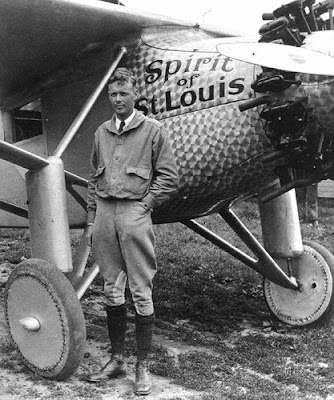In 1927, everybody knows that Charles Lindbergh became the first person to ever fly across the Atlantic Ocean… except he wasn’t (not by a long shot).
Back in 1913, a British newspaper called the Daily Mail (not to be confused with the Daily Male, which is an entirely different publication) offered a prize of 10,000 pounds to anyone who could cross the Atlantic Ocean by airplane in seventy-two hours or less. Adjusted for inflation, that would be over a million dollars today. Then World War I happened. Among the less devastating consequences of global armed conflict was the postponement of this contest.
The newspaper's challenge resumed in late 1918, and the following year, a full eight years before St. Louis even had any spirit, Lt. Commander Albert C. Read flew his aptly named seaplane the "Lame Duck" from New York City to Lisbon, Portugal, making numerous stops for repairs along the way. This included a ten-day layover in the Azores, and although he probably got some nice photos while he was there, since it took longer than three days, Read was ineligible to claim the prize money.
Less than three weeks later, British aviators Captain John Alcock and Lieutenant Arthur Brown said "fuck it" (metaphorically) and flew 1,890 miles nonstop from Newfoundland to Ireland. They crash landed in a swamp, but only after inadvertently flying upside down through dense, icy fog. Let me repeat that. They crash landed in a swamp after flying upside down through zero visibility conditions somewhere over the Atlantic Ocean, a body of water that no one had ever crossed nonstop by airplane before. These men were soon awarded the 10,000 pounds for accomplishing this feat, and I’m going to go ahead and assume that someone bought them a round of drinks in the first pub they stumbled upon.
The truth is that there were actually dozens of people who flew across the Atlantic Ocean before Charles Lindbergh. We know Lindbergh's name because when he landed in Paris, he was declared the winner of a different highly publicized contest. New York hotelier Raymond Orteig had offered a prize of $25,000 to the first Allied pilot to make this journey unaccompanied. The offer had been on the table for eight years by the time Lindbergh won it, and what better way to promote American nationalism and fancy New York hotels than with a photogenic young hero?
Lindbergh was also the first pilot who made this attempt to have his progress broadcast live on public radio. This was huge. People tuned in to hear if he would make it. The drama was palpable. When he safely landed in Paris, he went from being a curiosity on this newfangled medium of radio to a mass-media celebrity whose images and exploits were broadcast throughout the nation and the world in order to sell stuff.
And so it all began...





No comments:
Post a Comment